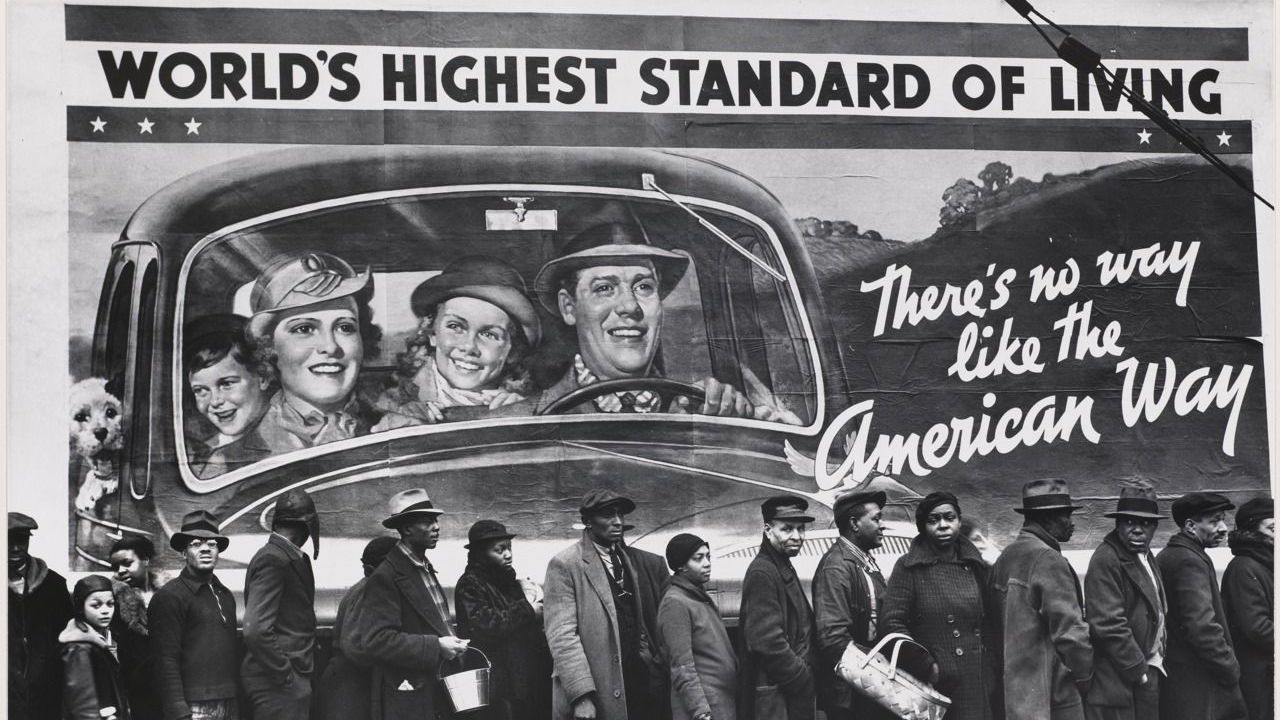Economist Darrick Hamilton explains why confronting the racial wealth gap is the only way to address 400 years of discrimination.
A stock market rebound and positive employment numbers for May sounds hopeful in the wake of the coronavirus shutdown. But the story is different if you happen to be black. For black Americans, unemployment actually went up in May, not down. What’s more, the bleak job story is just a part of the economic challenges they face due to persistent and systematic discrimination. Being black during an economic shock is extremely costly.
Economist Darrick Hamilton, executive director of the Kirwan Institute for the Study of Race and Ethnicity at Ohio State University, is known for his work in the emerging subfield of stratification economics, which focuses on how hierarchies and economic inequality form among groups. He talks to the Institute for New Economic Thinking about what has to be addressed before there can ever be justice for black people in America.
Lynn Parramore: Your work has illuminated structural racism in America and its negative economic impact on black Americans. How does this play out in the experience of economic shocks like Covid-19?
Darrick Hamilton: In America, black people have been rendered more vulnerable to economic shocks. You can see this by how much wealth they have when the shock occurs compared to whites. Black people are a subsistence population with very few assets to sustain themselves during crises and their workplace scenarios are more precarious.
We know the saying that blacks are the “first fired and the last hired.” That is a structural element of our society. This phenomenon exists across class and actually heightens with class.
Chris Famighetti and I have looked at the aftermath of the Great Recession for blacks v. whites at different levels of education. Relative to whites, the component of disparity in home ownership due to structural reasons increased for college educated blacks — a category of blacks best positioned with regards to resources — to a greater extent after the recession. Class is far less protective for black people than it is for white people.
LP: So even if you have a college degree, long considered a ticket into the middle class, an economic shock could very well make the ticket void if you’re black?
DH: There really isn’t a black middle class if it’s defined by wealth, because black people, en masse, do not have wealth. Those that have wealth that could sustain them when a shock comes are really few and far between.
We have far more parity on education and income in America than we have on wealth. This is what makes black people far more vulnerable from an economic standpoint. Not only do you have low wealth to begin with, and a more precarious job, you are also – and this is more subtle –you are also more politically vulnerable in a recession.
Take the case of the pandemic. Look, I’m pretty sure the discourse around going back to work would be different if it was white people who had more than twice the mortality rate from Covid-19 than black people. That’s a political vulnerability. We’re willing to tolerate a lot more pain as a country if it’s black people’s pain. That mindset figures into policy response, independent of the economic position by which we begin.
LP: If the economic shock hits harder, that probably means that recovery is less likely, right?
DH: Let’s look at the challenges faced by millennials as a whole. They came of age in the aftermath of a Great Recession, and they’ve ended up with what economists call “scarring effects.” We told them to go to college to better themselves, and then we structurally changed college, so the students incurred a greater burden of that cost than they had in the past. Millennials faced bad job prospects, high student debt, and low wealth transfers from parents because their parents’ wealth was reduced dramatically from the Great Recession.
Home ownership for millennials is lower than that of other generations at a similar age. In fact, we have lower home ownership for millennials than for any other generation dating all the way back to the Greatest Generation coming out of the Great Depression! What’s more, the racial home ownership gap amongst millennials is as large as it has ever been since we’ve been recording home ownership disparity. The millennial generation was scarred in general, and racial disparities amongst that group, at least in the dimension of home ownership, are more pronounced than they have been in any other generation, including the Greatest Generation.
You have people who are highly educated but have this albatross of debt on their neck. Now add on top of it Covid-19, which we can project is not going to be good for them. It’s almost a perfect storm. This is not just random — you can say that a pandemic is random, but we certainly could have been better prepared. After all, people predicted one was coming, so it was a policy choice not to be prepared and leave people vulnerable. We have had a neoliberal framework for the last 45 years, with an emphasis on deregulation which help to fuel the Great Recession. Government has been demonized as bad and inefficient. Race became a tool for labeling the government as inefficient and outwardly unfair, willing to tip the scales in favor of deadbeat dads, undeserving welfare queens, and superpredators. Our policy responses are not geared to help young people withstand and recover from economic crises, and that is especially true if you’re black, with all these false narratives feeding in.
LP: Your idea of “baby bonds” has attracted a lot of interest as a way to address the racial wealth gap – basically giving every American baby a certain amount of seed capital, depending on the wealth of their parents, so that they could take part in the capitalist system when they reach adulthood. How does this concept fit into the conversation on reparations that is coming to the forefront now?
DH: The baby bonds idea is discrete from reparations. It ensures that everyone has a capital foundation set up at birth regardless of race, gender, etc., which they could acquire when they become a young adult. That way, they won’t be locked out of a process of asset accumulation. Having that seed capital means that they will be empowered to get themselves an asset which will increase over their lives.
Baby bonds is a prospective program that exists in perpetuity, and it is complimentary to reparations, which is a retrospective program that requires the U.S. to do a full analysis of its history. This analysis is critical so that we can finally dismiss those narratives around deadbeat dads and the idea that certain people are genetically, attitudinally, or behavioral deficient. The first step is to understand that it was resource deprivation and extraction, as well as the exploitation of people’s personhood and property, that resulted in the inequality we see today.
The truth is important, because it dispels the narratives that lead us into bad policy. It dispels the narrative that we need government as a sanctioning body of bad behavior as opposed to a body that empowers people with the resources they need to thrive. Policy is grounded in narratives, and in order to do the narrative work, we need truth.
But truth is not enough. Even reconciliation isn’t enough. Reconciliation becomes empty without substance and a commitment to redress. That’s where reparations comes into play.
LP: There are many different approaches to reparations floating around right now. Some argue that it’s time to write a check to black American descendants of those who were enslaved. What do you think of that method?
DH: There’s nothing wrong with writing a check, but I don’t think it’s sufficient. Not because I think black people are dysfunctional and will just go buy, as the cliché goes, a Cadillac with the money. So what if they do buy a Cadillac? That’s not the problem. The problem is that black people don’t own stock in Cadillac. Because we are a subsistence population that doesn’t own the means of production, nor any assets with regard to property, en masse, the stimulus and reparations could actually have the unintended effect of leading to even more inequality.
LP: How might wealth inequality get worse with direct reparations payments?
DH: It could make black people worse off in relative terms. Let’s say somebody bought a Cadillac. What happens when you do that? You pay the dealer. Who is that dealer? Probably a white person. So, the white person has also gotten an increase in their income. What does the white person do with that income? They turn around and go buy something else. Who do they buy it from? Another white person. Now you’ve grown the white income by the first payment, the next payment, and so on. You set off what economists call a “multiplier effect” where white people might end up relatively even better off than black people who got the initial stimulus in the first place.
The point is that black people don’t own the means of productions. If you own stocks in Cadillac, buying a Cadillac isn’t a problem. What you need are assets. You need wealth, because wealth begets wealth. That is the fundamental difference between wealth and income. Income is a one-time thing, usually spent on subsistence, but wealth is something that you have in perpetuity. The returns continue to come. From wealth you not only get a return, periodically, in the form of income, but the wealth itself can appreciate and grow.
There is nothing wrong with some forms of reparations as direct cash payments. It sends the message, “Ok, we did harm to you, so you are entitled to this payment to do whatever the hell you want with it.” There’s value and dignity in that—unconditional cash. But from a functional aspect, reparations should also include some transfer of either land or means of production so that there are asset transfers that give black people resources in perpetuity.
Good public policy could include baby bonds and reparations. Reparations alone would be a one-time race-specific fix that would redress the past, but it would not address the structural consolidation that a capitalist system brings, to both blacks and white albeit with varying degrees, without some intervention.
LP: Do you think America is ready to finally get real about black people receiving justice?
DH: I’m committed to justice as a matter of faith, even beyond the empirics, so a timeline doesn’t constrain me. To get up and go to work I have to be undeterred by what people think is possible and not possible in the here and now. I’m a person who is driven by logic and empirics, but there’s no amount of data that one could give to me that would deter me from my commitment to justice, feasible or not.
We need a long horizon. If it takes us 30 years, then it takes us 30 years. We need to put the work in now to get to that point. I don’t know how long it’s going to take, but I do know that things change in history in ways that none of us can understand. Elements can come together in ways that none of us can predict.
There seems to be something different about this younger cohort in American history that I’ve seen, at least in my life. They’re different from my generation. Yes, we marched in the streets in response to Rodney King and stuff like that, but we didn’t do it the same way. We were not committed to the ideals of justice the way they are. They will simply say “F.U., we demand justice.” We nuanced justice. We bought into some of those tropes of well, black people first have to pull their pants up and women gotta dress a certain way and stop enticing people. This younger generation simply says, “I’ll wear what I want to wear, don’t touch me!” That’s hopeful.
There’s a story of why that may be. These young people have suffered a lot that we didn’t. We were more privileged in some ways. We had the crack epidemic and mass incarceration, but we didn’t have Great Recessions, student debt, and now Covid-19. We didn’t come into our young adulthoods under those conditions.
By now America has had 45 years of neoliberalism. At some point along the way, the rhetoric may stop working. The data has been catching up with rhetoric. Now we see things like Covid-19 occurring at the same time that the George Floyd video is circulated and at the same time that 20 million Americans are unemployed. And in the same moment, you have somebody in the White House talking about martial law. Is that enough to bring about change? I don’t know. I hope so. I do know that despair and cynicism are strategies used by the other side. I say, to hell with despair. It is our economy, it is our money, and it is our government. The answer to change is that it will happen when we seize it.






